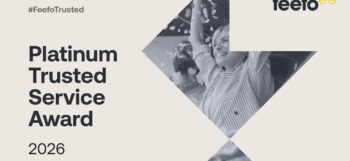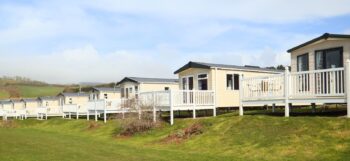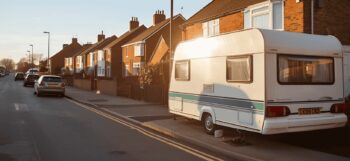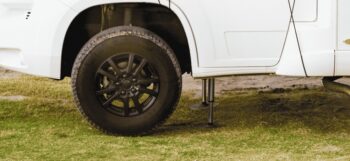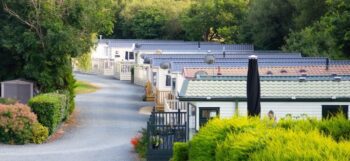Downsizing to a park home is an increasingly popular choice for many people in the UK.
As we approach retirement age, the idea of simplifying our surroundings can be highly appealing. Whether it's for financial reasons, a desire for a more manageable living space, or simply the appeal of living in a close-knit community, park homes offer a unique solution to this new chapter of life.
But what exactly does downsizing to a park home entail?
In this guide, we aim to cover all things associated with making the move from a traditional bricks-and-mortar house to a park home. From the benefits and challenges to the practical steps involved, we'll touch on some of the things you need to know to make an informed decision about park home living.
Why Consider Downsizing to A Park Home? – The Pros
Financial benefits
One of the main reasons many people consider downsizing to a park home is the financial advantage.
Compared to traditional homes, park homes are often more affordable. The lower purchase price can free up significant equity, which can be used to boost retirement savings, fund travel, or simply help you to enjoy a more relaxed lifestyle. Additionally, ongoing costs like utility bills and maintenance are typically lower in a park home, leading to further savings.
Lifestyle improvements
Downsizing to a park home is said to bring a simpler and less stressful way of life. Park homes are typically easier to maintain, granting you more time to enjoy hobbies, travel, or spend time with family. Many park home sites have a strong community feel, with social events and activities that can be particularly appealing as we grow older. This community aspect often leads to increased social interaction, which can help to reduce the risk of loneliness.
Environmental impact
For those who have concerns about their carbon footprint, park homes can be a greener option to bricks and mortar living. Modern park homes are built with energy efficiency in mind, often with better insulation and more efficient heating systems than older, traditional homes. This not only helps reduce your energy bills but can also help to lessen the damage you cause to the environment.

Omar Heritage park home - image courtesy of Omar Group
The Process of Downsizing to a Park Home
Researching the right park home
When considering downsizing, it's crucial to do your homework.
Park homes come in various sizes, with different layouts and levels of luxury. Think about your needs; do you require a second bedroom for guests, or a larger kitchen because you love cooking? Equally important is the location of the park home site. Consider the site’s proximity to amenities like shops, GP surgeries, and public transport. If you're moving away from family, ensure they’re not too far away for regular visits.
Legal considerations
Buying a park home involves legal considerations that are different to those you’d encounter when purchasing a traditional home. Being mindful of the following can help to ensure that your rights are protected and that you understand the obligations associated with park home ownership.
Firstly, you'll need to understand the Mobile Homes Act 1983. This legislation governs the relationship between park homeowners and site owners. It provides important safeguards for park homeowners, including security of tenure, the right to sell or gift your park home, and rules about pitch fees. Familiarising yourself with the act can help you to gain a better understanding of your legal rights as a park homeowner.
When you live on a park home site you will enter into a pitch agreement with the site owner. The agreement is a key document that sets out your rights to station your park home on the site and your obligations, including payment of pitch fees.
Site rules: Each park home site will have its own set of rules, which can cover anything from parking to pets, and even how you can maintain or modify your home. Make sure you review these rules carefully before purchasing, as they can significantly affect your lifestyle.
Pitch fees: These are regular payments you make to the site owner, giving the right to keep your park home on their land. These charges can vary depending on the site’s location and its facilities. Ensure you understand how these fees are calculated, what they cover, and how often they can be increased.
Other legal considerations include, selling or giving away your park home and park repairs and improvements.
Selling your current home
If you're selling your current home to downsize, it's important to prepare it for sale. Decluttering, redecorating, and making necessary repairs can help you achieve the best possible sale price. Working with an experienced estate agent and conveyancer will smooth the selling process, helping you transition to your new park home with ease.
Moving in
Transitioning to a park home involves adjusting to a different style of living. You may need to reduce your belongings significantly, as park homes typically offer less storage space than standard homes.
Take the time to carefully select what you'll bring with you and consider investing in multi-purpose furniture such as a sofa bed, chairs with storage or a coffee table that can also be used as a dining table. While the first few months may involve some adjustment, many find the simpler, more manageable living space to be a refreshing change.

Middleton park home kitchen - image courtesy of Omar Group
Things to Watch Out For
While downsizing to a park home can offer numerous benefits, it’s also important to consider the potential drawbacks. Here are some cons of downsizing that you should be aware of:
Resale value
Park homes can depreciate over time, so it's important to consider this when buying. Factors like the condition of the home, its location, and the desirability of the site will all impact its resale value. Maintaining your park home and keeping it up to date can help to preserve its value.
Smaller living area
Park homes typically offer less space than traditional houses. This means you may need to part with many of your belongings, which can be difficult, especially if you have sentimental attachments.
Less storage
With less room comes less storage space. You might find it challenging to store items like seasonal decorations, sports equipment, or hobby supplies.
Market limitations when selling park home
With the market for park homes being niche, it could make selling your home more challenging compared to a traditional bricks-and-mortar property.
Annual pitch fee increases
We’ve already explained that pitch fees are an ongoing cost that you’ll need to budget for. Pitch fees often increase annually, and these increases can sometimes be more than the current rate of inflation, adding to your financial burden over time.
Maintenance and repair limitations
As park homes age, they may require more maintenance and repairs, which can be costly. Certain materials, such as plywood and timber framing used in park home fabrication may not last as long as materials used to construct traditional homes.
Restrictions on permanent residency
Some park home sites are designated as holiday sites, meaning you cannot live there year-round. It’s important to confirm whether the site allows permanent residency before purchasing on such a site.
It’s important to consider the positive and the negative aspects of downsizing to a park home to help you avoid any nasty surprises along your buying and park home living journey.

Wessex Dorset park home dining area – image courtesy of Omar Group
One final thing
Park homes may require specialist insurance, which can differ from standard home insurance. Make sure you choose a policy that covers aspects of your park home you may require such as the structure, contents, and liability.
We’ve been supporting park homeowners with comprehensive park home insurance for more than 30 years. Our policy is underwritten by a specialist park home insurer and has been shaped to meet the specific needs of park homeowners, based on feedback from customers just like you.
We’ve included Legal Expenses cover[1] and 24-hour Home Emergency cover[2] as standard, so you can rest assured that you have the protection you may need all in the one premium. And you can enhance your policy further with Key cover or Home Excess protection[3] aimed to offer you additional peace of mind.
Our experienced and friendly agents can explain the options, so you build the policy that meets your needs. Call us today on 01480 402 460 to see how we can help.
Terms and conditions, limitations, exclusions and acceptance criteria apply. Policy enhancements are subject to an additional premium.
[1] Family legal expenses and key cover underwritten by ARAG plc, a cover holder of the insurer, ARAG Allgemeine Versicherungs-AG Branch UK
[2] Home emergency cover is underwritten by Astrenska Insurance Limited, a trading style of Collinson Insurance Services Limited
[3] Home excess protection is underwritten by Astrenska Insurance Limited
Disclaimer: The sole purpose of this article is to provide guidance on the issues covered. This article is not intended to give legal advice, and, accordingly, it should not be relied upon. It should not be regarded as a comprehensive statement of the law and/or market practice in this area. We make no claims as to the completeness or accuracy of the information contained herein or in the links which were live at the date of publication. You should not act upon (or should refrain from acting upon) information in this publication without first seeking specific legal and/or specialist advice. Lifesure Group Limited trading as Lifesure and Lifesure Insurance Broker accepts no liability for any inaccuracy accepts no liability for any inaccuracy, omission or mistake in this publication, nor will we be responsible for any loss which may be suffered as a result of any person relying on the information contained herein.
FP1356-2024


